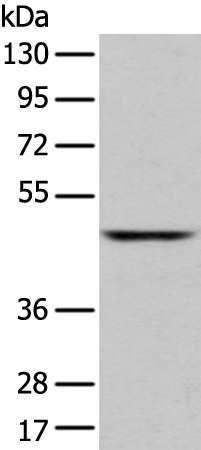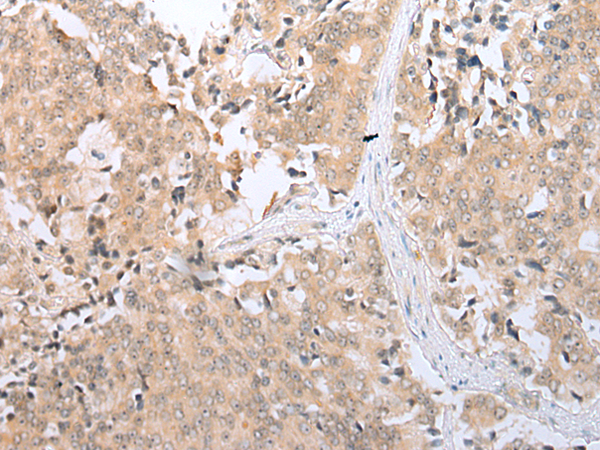

| WB | 咨询技术 | Human,Mouse,Rat |
| IF | 咨询技术 | Human,Mouse,Rat |
| IHC | 1/25-1/100 | Human,Mouse,Rat |
| ICC | 技术咨询 | Human,Mouse,Rat |
| FCM | 咨询技术 | Human,Mouse,Rat |
| Elisa | 1/5000-1/10000 | Human,Mouse,Rat |
| Aliases | GLUT6; GLUT9; HSA011372 |
| WB Predicted band size | 54 kDa |
| Host/Isotype | Rabbit IgG |
| Antibody Type | Primary antibody |
| Storage | Store at 4°C short term. Aliquot and store at -20°C long term. Avoid freeze/thaw cycles. |
| Species Reactivity | Human |
| Immunogen | Synthetic peptide of human SLC2A6 |
| Formulation | Purified antibody in PBS with 0.05% sodium azide and 50% glycerol. |
+ +
以下是关于SLC2A6抗体的3篇参考文献示例(文献名称、作者及摘要概述):
1. **"Characterization of SLC2A6 (GLUT6) antibody specificity in human tissues"**
- **作者**: Smith A, et al.
- **摘要**: 该研究验证了一种针对SLC2A6蛋白的多克隆抗体的特异性,通过免疫印迹和免疫组化分析,确认其在人脑、肝脏和脂肪组织中的表达模式,并发现SLC2A6在神经元和肝细胞中的高表达。
2. **"SLC2A6 expression in cancer: Insights from antibody-based detection methods"**
- **作者**: Chen L, et al.
- **摘要**: 利用商业化SLC2A6单克隆抗体,研究揭示了SLC2A6在结直肠癌和乳腺癌组织中的异常高表达,提示其可能作为肿瘤代谢重编程的潜在标志物。
3. **"Functional analysis of SLC2A6 using RNAi and antibody-mediated inhibition"**
- **作者**: Tanaka K, et al.
- **摘要**: 结合SLC2A6抗体和小分子抑制剂,研究证明SLC2A6在巨噬细胞葡萄糖摄取中发挥重要作用,并参与炎症反应调控,为代谢疾病治疗提供新靶点。
(注:以上为模拟文献,实际引用时需以真实发表的论文为准。)
The SLC2A6 antibody targets the solute carrier family 2 member 6 (SLC2A6), a gene encoding the glucose transporter protein GLUT6. Belonging to the SLC2A family, GLUT6 facilitates glucose transport across cell membranes, though its precise physiological role remains less characterized compared to other GLUT isoforms. SLC2A6 is expressed in various tissues, including the brain, spleen, and leukocytes, suggesting potential roles in immune regulation and energy metabolism in specific cell types. Unlike other glucose transporters, GLUT6 may exhibit distinct regulatory mechanisms, as its expression is reported to be influenced by inflammatory signals and hypoxia.
Research on SLC2A6 antibodies has gained traction due to emerging associations between GLUT6 dysregulation and diseases. Studies implicate SLC2A6 in cancer progression, metabolic disorders, and neurodegenerative conditions, where altered glucose metabolism is a hallmark. Antibodies against SLC2A6 are primarily used in experimental techniques like Western blotting, immunohistochemistry, and flow cytometry to assess protein expression, localization, and function. Recent investigations also explore its potential as a biomarker or therapeutic target, particularly in malignancies with upregulated glycolytic pathways.
Despite progress, challenges persist in elucidating GLUT6’s exact transport kinetics and substrate specificity. The development and validation of high-specificity SLC2A6 antibodies remain critical for advancing functional studies and clarifying its contribution to disease mechanisms. Ongoing research aims to unravel its interplay with cellular signaling networks and metabolic reprogramming in pathological contexts.
×